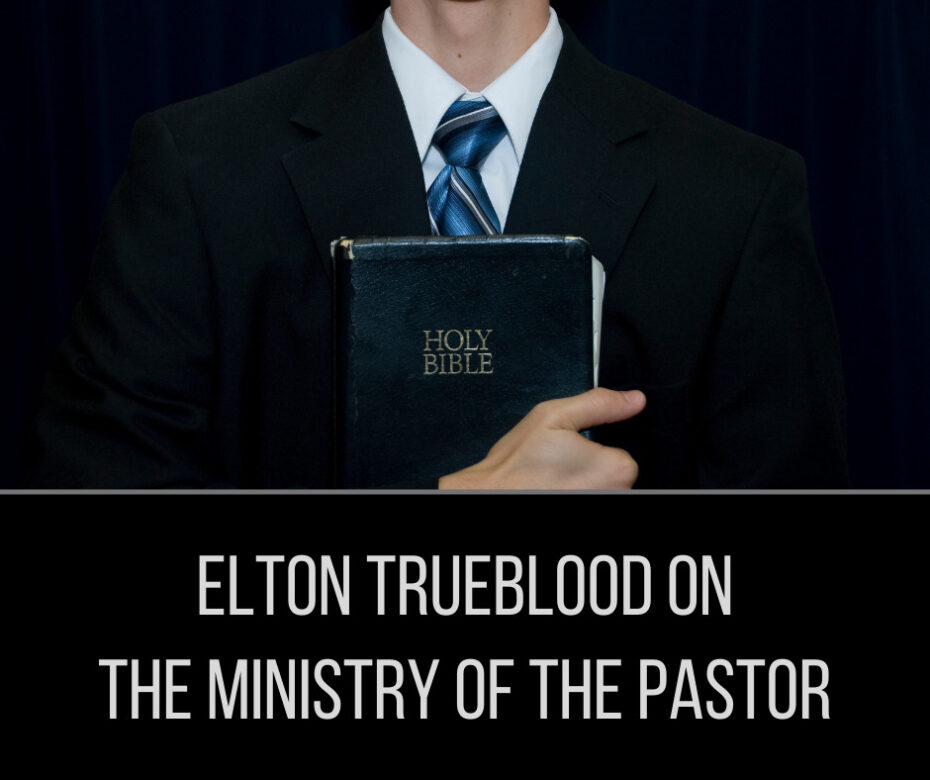What does it mean to be a pastor?
The popular conception is that the pastor is the man who gets paid to do all the ministry—at least, all the important “religious” stuff. He wears special clothes such as a robe and collar. He has the unique authority to marry, bury, and preach. And he is responsible for most of the visiting and counseling. And consequently, he is also the one who gets burned out.
Readers of this blog know better than that, but I’m talking about the popular imagination.
Elton Trueblood was a Quaker writer who wrestled with the way Christian communities are to do ministry together. And unlike many Quakers, he defended the role of the pastor…properly understood.
On the one hand, he thought the Quakers were right to reject the clerical view of ministry that had prevailed in the 17th century and onwards. In that tradition, the only “ministers” were ordained clergy who belonged to the state church and who often seemed to do their job for the purpose of social advancement more so than for the sake of Christ:
Men in this profession were called “hireling priests,” not chiefly because they seemed to make the ministry more of a job than a calling. They found the clerical life to be the shortest route to preferment, to social prestige, and to political influence (Trueblood, Basic Christianity, p. 77).
Clearly, that was an unbiblical view of ministry and ministers.
On the other hand, Trueblood was also critical of the way many Quakers had rejected pastors altogether for the ideal of a universal lay ministry. Their intent in rejecting pastors was to have everyone do ministry, but the actual results were quite different:
In practice this often leads to no ministry or to a ministry so fragmentary and so secularized that the meeting for worship begins to have the mood of a political forum (Trueblood, Basic Christianity, p. 77).
To those who rejected the very idea of a pastor (which was common among Quakers, but which you’ll also find in the “house church” and “organic church” movements), Trueblood answered that while all Christians are called to do ministry, they cannot all be equally responsible for it. Some people will always be more responsible than others, because they have more ability to do it and more concern for it:
It is not at all the same as saying that all members have equal responsibility and that mere lay religion is consequently sufficient. The fact is that people cannot have equal responsibility because they do not have equal powers and, what is more important, they do not have equal concerns (Trueblood, Basic Christianity, p. 77).
But having some people with more responsibility than others is not the same as having one leader who monopolizes the “religious” duties.
So what does the pastor do?
In Trueblood’s opinion, we needed to recover the Biblical model of the pastor, which was something different from the popular conception of that role:
This unique ideal which is equidistant from “no ministry” on one side and from “status ministry” on the other is really the ideal embedded in the New Testament. The classic statement is that of Ephesians 4:11, 12, where we are told that God has given some men the gift and consequent responsibility of being “pastors and teachers” and that their function is the perfecting of the members for their work in the ministry (Trueblood, Basic Christianity, p. 77).
Here is the passage:
And He Himself gave some to be apostles, some prophets, some evangelists, and some pastors and teachers, for the equipping of the saints for the work of ministry, for the edifying of the body of Christ (Eph 4:11-12, emphasis added).
For Paul, the gift of being a pastor/shepherd is for equipping others. As Trueblood summarized:
A pastor, then, in Biblical terms, is a humble person who has a special ability in performing that kind of ministry which helps other people to perform their ministry, whatever it may be (Trueblood, Basic Christianity, p. 77).
I think you’ll agree that we need more Free Grace pastors, equipping grace believers to do ministry in grace churches.


